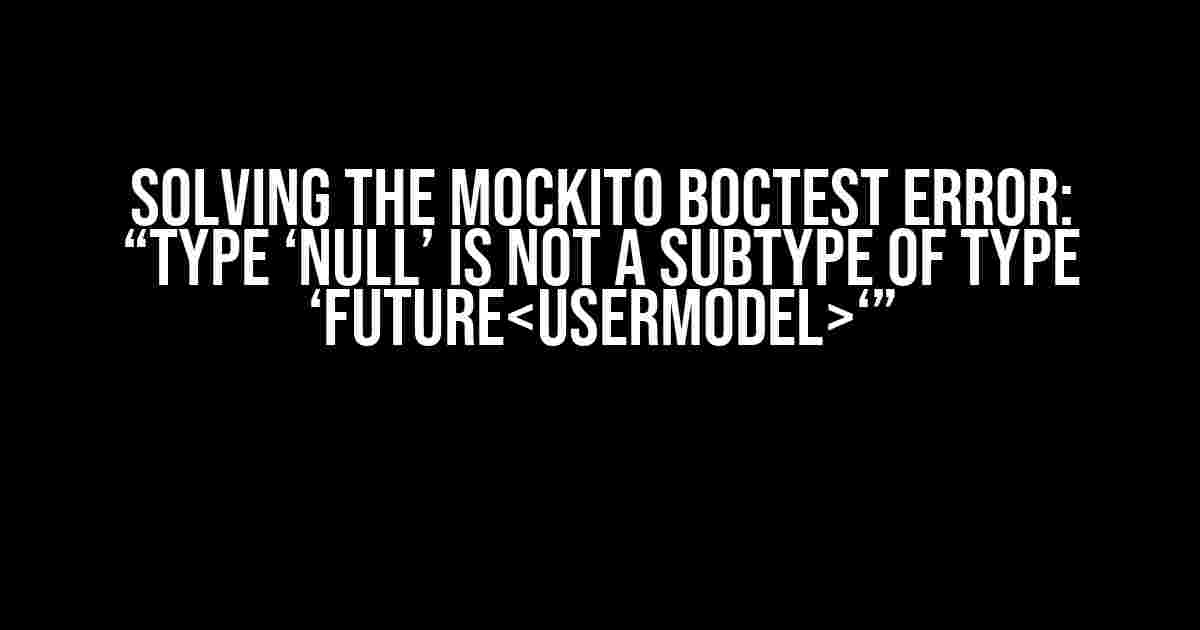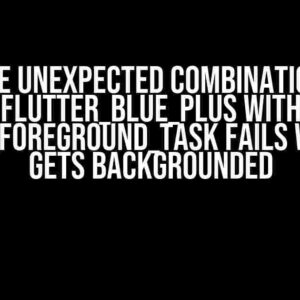Are you tired of encountering the frustrating Mockito BocTest error “type ‘Null’ is not a subtype of type ‘Future
What’s the Problem?
Before we dive into the solution, let’s take a step back and understand what’s causing this error. When using Mockito with BlocTest, you’re essentially creating a mock object that mimics the behavior of a real object. In this case, the error occurs when the mock object returns a null value, which is not compatible with the expected Future
This error typically arises when you’re trying to test a Bloc that relies on a Future-based API call. The issue lies in the fact that Mockito doesn’t know how to handle the Future return type, resulting in a null value being returned instead.
The Solution
So, how do we solve this problem? Fear not, for the solution is quite straightforward. We’ll use a combination of Mockito’s when method and thenAnswer to return a Future that complies with the expected return type. But before we dive into the code, let’s set up a simple example.
A Simple Example
Let’s say we have a simple UserRepository that retrieves user data from an API:
abstract class UserRepository {
Future<UserModel> getUserData();
}
We can create a mock implementation of this repository using Mockito:
@Mock()
UserRepository userRepository;
Now, let’s write a test that uses BlocTest to verify that our Bloc correctly handles the user data:
void main() {
group('UserBlocTest', () {
late UserBloc userBloc;
setUp(() {
userBloc = UserBloc(userRepository: userRepository);
});
test('loads user data', () async {
// Arrange
when(userRepository.getUserData()).thenAnswer((_) async => UserModel());
// Act
userBloc.loadUserData();
// Assert
await untilCalled(userRepository.getUserData());
verify(userBloc.state).userData(ActivityResult.success(UserModel()));
});
});
}
In this example, we’re using Mockito’s when method to specify that when getUserData() is called, it should return a Future that resolves to a UserModel instance. However, this is where the error occurs, as Mockito doesn’t know how to handle the Future return type.
Fixing the Error
So, how do we fix this error? The solution lies in using Mockito’s thenAnswer method to return a Future that complies with the expected return type. Here’s the modified code:
void main() {
group('UserBlocTest', () {
late UserBloc userBloc;
setUp(() {
userBloc = UserBloc(userRepository: userRepository);
});
test('loads user data', () async {
// Arrange
when(userRepository.getUserData()).thenAnswer((_) => Future.value(UserModel()));
// Act
userBloc.loadUserData();
// Assert
await untilCalled(userRepository.getUserData());
verify(userBloc.state).userData(ActivityResult.success(UserModel()));
});
});
}
By using thenAnswer with a callback function that returns a Future using Future.value, we’re telling Mockito to return a Future that resolves to a UserModel instance. This fixes the error and allows our test to run successfully!
Best Practices
When using Mockito with BlocTest, it’s essential to follow some best practices to avoid common pitfalls:
-
Use
whenandthenAnswercarefullyMake sure to specify the correct return type when using
whenandthenAnswer. In this case, we usedFuture.valueto return a Future that resolves to a UserModel instance. -
Avoid using
anyas a return typeAvoid using
anyas a return type, as it can lead to unpredictable behavior. Instead, specify the exact return type expected by your Bloc. -
Verify mock interactions
Always verify that the expected interactions occurred between your Bloc and the mock repository. This ensures that your test is covering the correct scenarios.
Conclusion
In conclusion, the “type ‘Null’ is not a subtype of type ‘Futurewhen and thenAnswer methods correctly, you can write robust unit tests for your Flutter application. Remember to follow best practices and verify mock interactions to ensure your tests are accurate and reliable.
Frequently Asked Questions
Got more questions about Mockito and BlocTest? Here are some frequently asked questions:
| Q | A |
|---|---|
| What is the purpose of Mockito? | Mockito is a popular mocking framework for unit testing in Java and other languages. It allows you to create mock objects that mimic the behavior of real objects, making it easier to write unit tests. |
| What is BlocTest? | BlocTest is a testing library for Flutter that provides a simple way to write unit tests for your Bloc-based application. It allows you to verify the behavior of your Bloc and its interactions with other components. |
| How do I fix the “type ‘Null’ is not a subtype of type ‘Future |
To fix this error, use Mockito’s when and thenAnswer methods to return a Future that complies with the expected return type. In this case, we used Future.value to return a Future that resolves to a UserModel instance. |
I hope this article has helped you solve the “type ‘Null’ is not a subtype of type ‘Future
Frequently Asked Questions
Get answers to the most common questions about Mockito BLoC test errors!
Q1: What does the error “type ‘Null’ is not a subtype of type ‘Future‘” mean?
This error means that you’re trying to return a null value where a Future of type UserModel is expected. This is likely due to a null safety issue in your Mockito BLoC test setup.
Q2: How do I fix the “type ‘Null’ is not a subtype of type ‘Future‘” error?
To fix this error, make sure you’re returning a valid Future of type UserModel in your Mockito BLoC test setup. You can use Mockito’s built-in functionality, such as `when` and `thenAnswer`, to return a mocked Future.
Q3: Why do I get the “type ‘Null’ is not a subtype of type ‘Future‘” error in my BLoC test?
This error can occur if your BLoC test is not properly set up to handle the asynchronous nature of your code. Make sure you’re using `await` or `then` to wait for the Future to complete before asserting the result.
Q4: Can I use Mockito’s `any` instead of specifying the exact type?
No, you should avoid using Mockito’s `any` in this case, as it can mask the underlying issue. Specifying the exact type helps you catch type-related errors at compile-time, rather than runtime.
Q5: How can I ensure my BLoC test is properly set up to handle Futures?
To ensure your BLoC test is properly set up to handle Futures, make sure you’re using `async` or `await` keywords, and that you’re properly handling errors using `try-catch` blocks or `catchError` methods.


